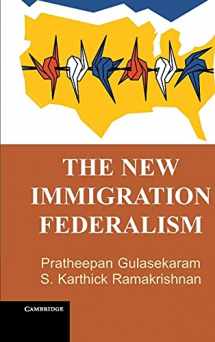
The New Immigration Federalism
ISBN-13:
9781107111967
ISBN-10:
110711196X
Author:
S. Karthick Ramakrishnan, Pratheepan Gulasekaram
Publication date:
2015
Publisher:
Cambridge University Press
Format:
Hardcover
300 pages
FREE US shipping
Book details
ISBN-13:
9781107111967
ISBN-10:
110711196X
Author:
S. Karthick Ramakrishnan, Pratheepan Gulasekaram
Publication date:
2015
Publisher:
Cambridge University Press
Format:
Hardcover
300 pages
Summary
The New Immigration Federalism (ISBN-13: 9781107111967 and ISBN-10: 110711196X), written by authors
S. Karthick Ramakrishnan, Pratheepan Gulasekaram, was published by Cambridge University Press in 2015.
With an overall rating of 4.4 stars, it's a notable title among other
Emigration & Immigration
(Administrative Law, Federal Jurisdiction, Urban, State & Local Government, Public Affairs & Policy, Politics & Government) books. You can easily purchase or rent The New Immigration Federalism (Hardcover) from BooksRun,
along with many other new and used
Emigration & Immigration
books
and textbooks.
And, if you're looking to sell your copy, our current buyback offer is $0.3.
Description
Since 2004, the United States has seen a flurry of state and local laws dealing with unauthorized immigrants. Though initially restrictionist, these laws have recently undergone a dramatic shift toward promoting integration. How are we to make sense of this new immigration federalism? What are its causes? And what are its consequences for the federal-state balance of power? In The New Immigration Federalism, Professors Pratheepan Gulasekaram and S. Karthick Ramakrishnan provide answers to these questions using a mix of quantitative, historical, and doctrinal legal analysis. In so doing they refute the popular "demographic necessity" argument put forward by anti-immigrant activists and politicians. Instead, they posit that immigration federalism is rooted in a political process that connects both federal and subfederal actors: the Polarized Change Model. Their model captures not only the spread of restrictionist legislation but also its abrupt turnaround in 2012, projecting valuable insights for the future.


We would LOVE it if you could help us and other readers by reviewing the book
Book review

Congratulations! We have received your book review.
{user}
{createdAt}
by {truncated_author}


